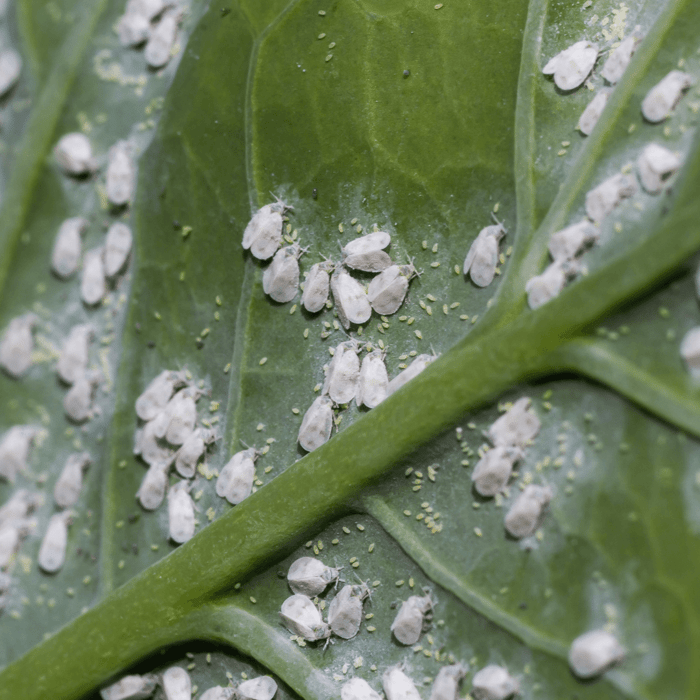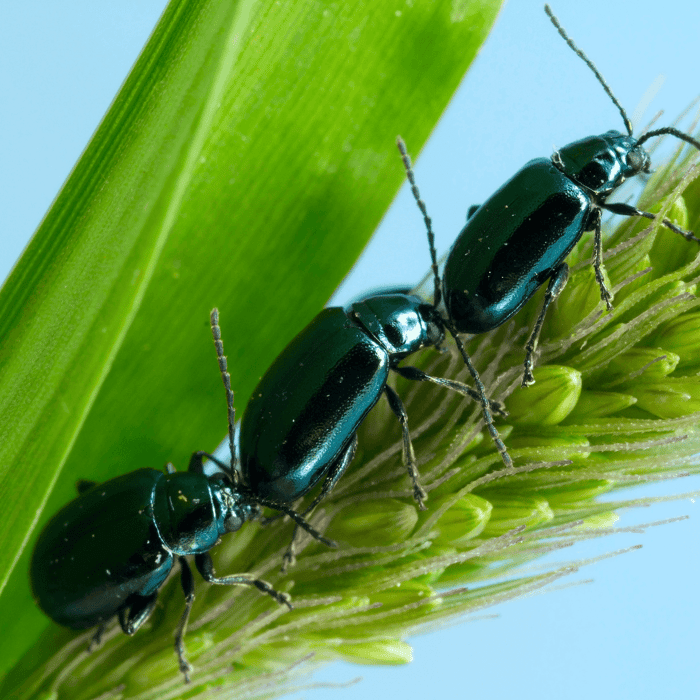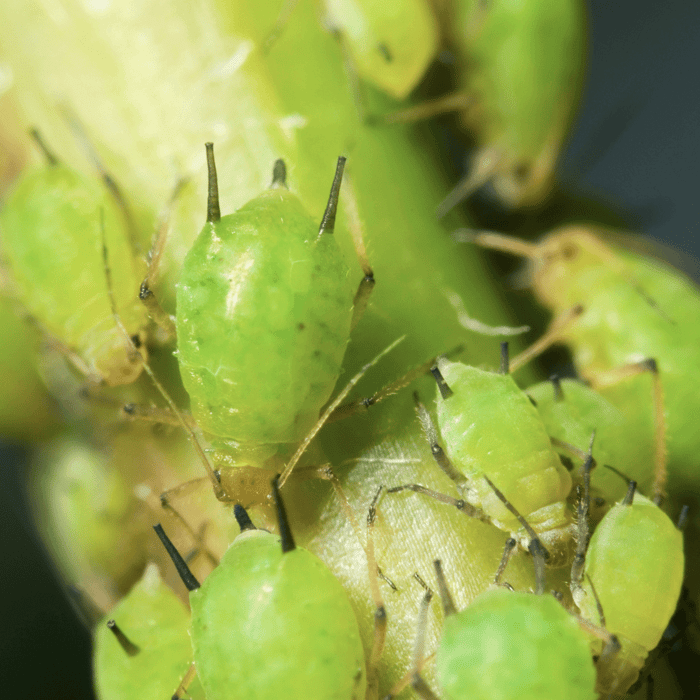Whiteflies are small insect pests that can cause serious harm to plants in your garden. They're tiny, with a wingspan of only about a millimeter or two. However, don't let their size fool you; they can cause significant damage to your plants if not controlled. I will walk you through how to get rid of whiteflies in your garden so you can have less stress this gardening season!
These insects have a broad host range and feed on the sap of various plants, including vegetables, fruits, and ornamentals. Whiteflies lay their eggs on the underside of leaves and develop quickly.
The eggs hatch into nymphs, and before long, they become adult whiteflies themselves. These pests are active year-round in tropical climates but tend to be more active during warm seasons in temperate climates.
Seed Safe Survival Seed Kit - 35 Variety Pack

$29.95
$49.95
Seed Safe Survival Seed Kit: The Ultimate Heirloom Collection for Self-Sufficient Gardening Introducing the Seed Safe - 35 Varieties of Heirloom Vegetable, Herb, and Fruit Seeds, the ultimate solution for gardeners who want to secure a bountiful future harvest. This… read more
The Importance of Getting Rid of Whiteflies
If left uncontrolled, whiteflies will wreak havoc on your vegetable garden's health and appearance. They suck the sap from plant tissues which weakens their growth and development.
This results in leaves turning yellow and eventually dropping off the plant altogether. Moreover, whiteflies secrete something as they feed from various plants, which attract other pests like ants and sooty mold fungus.
Ants love the secretion because it's rich in sugars - they'll protect the whitefly population to ensure a reliable food source for themselves. Sooty mold fungus grows on honeydew deposits produced by the whitefly; it blocks sunlight from reaching leaves resulting in stunted growth or even death of plant tissues beneath it.
Therefore, watching for these small insects is essential if you want healthy vegetable and flower gardens! Before you even plant your first seed packet, it might be a good idea to keep in mind how you're going to control whiteflies and other pests in your garden. Now that we've covered why getting rid of whiteflies is vital, let's get started on how to identify them!
Identifying Whiteflies
Whiteflies are tiny, flying insects that belong to the family Aleyrodidae. They are often found in large groups on the undersides of leaves, where they suck sap from the plant.
If left untreated, they can cause significant damage to your garden. Here's what you need to know to identify whiteflies.
Physical Appearance
Whiteflies are small, moth-like insects with powdery white wings and yellowish bodies. They are usually about 1/16 inch long and have four wings covered in a waxy powder. The adults have piercing-sucking mouthparts that they use to feed on the sap of plants.
Damage caused by whiteflies
Whiteflies can cause significant damage to plants if left unchecked. They feed on plant sap, which can weaken the plant over time.
This can lead to stunted growth, yellowing or browning of leaves, and even death of the plant in severe cases. In addition to damaging plants by feeding on them, whiteflies also secrete a sticky substance called honeydew.
This sticky substance can attract other insects like ants and wasps, which may further damage your plants. In some cases, whiteflies may also transmit viral diseases from one plant to another as they move from plant to plant.
The life cycle of Whiteflies
Understanding the life cycle of whiteflies is essential for controlling their population in your garden. Whitefly eggs are laid on the underside of leaves and hatch into nymphs after a few days. These nymphs then molt several times before becoming adults.
The entire life cycle takes about four weeks (depending on temperature), and there may be multiple generations per year. Monitoring your garden regularly for signs of whitefly infestation is important so you can take action quickly before their population gets out of control.
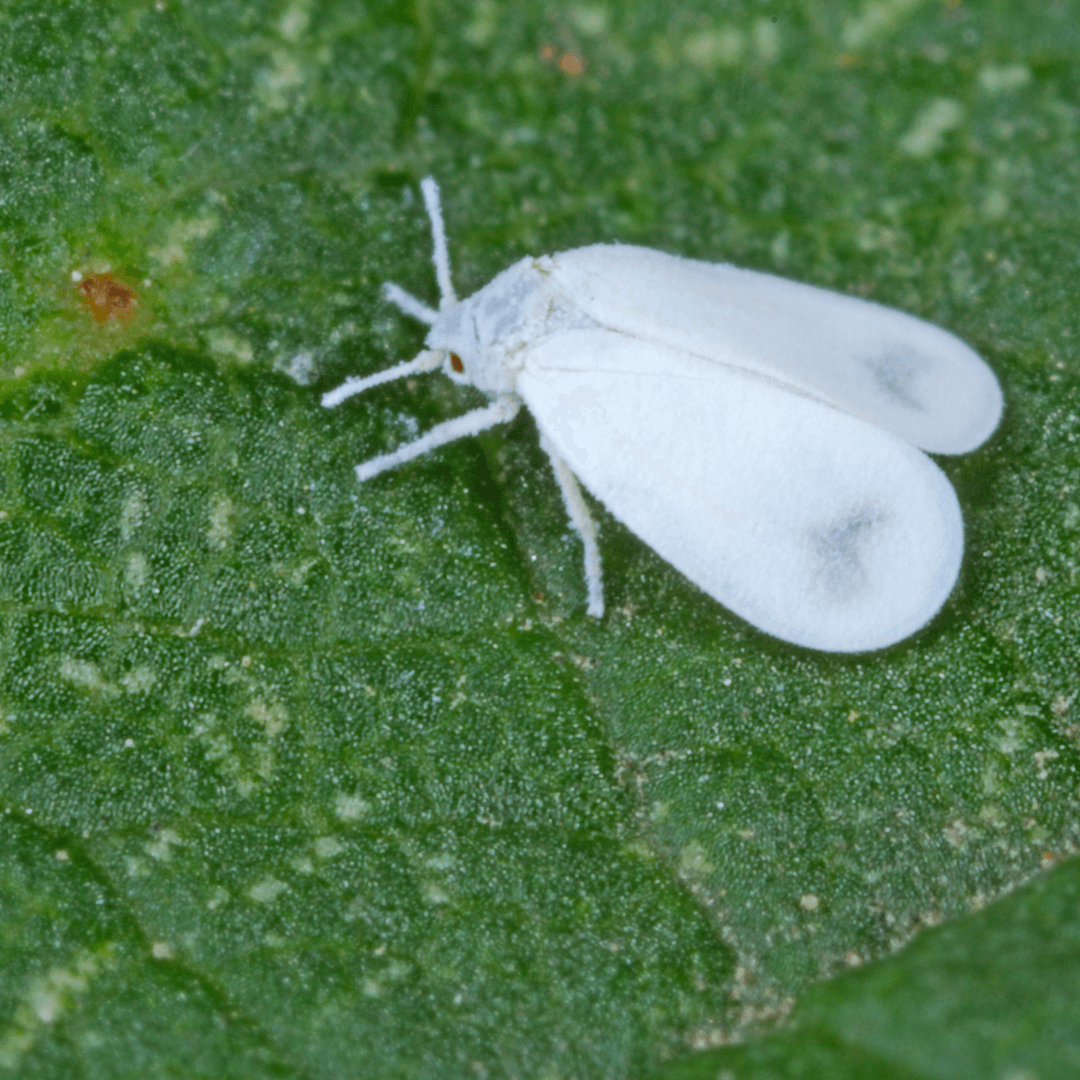
Prevention of Whiteflies
Choosing the Right Plants
One of the best ways to prevent whiteflies from infesting your garden is by choosing naturally resistant plants. Some of these plants include marigolds, petunias, and geraniums.
These plants have natural oils and scents that repel whiteflies. If you already have plants in your garden susceptible to whiteflies, consider planting one of these resistant options nearby as a deterrent.
Proper Watering and Fertilization Techniques
Whiteflies prefer dry conditions, so keeping your garden well-watered is important. However, overwatering can lead to fungal growth, attracting even more pests.
Ensure you're watering your garden deeply but infrequently - aim for about an inch of water per week. Additionally, avoid fertilizing with nitrogen-rich fertilizers as they can promote new growth that is especially attractive to whiteflies.
Regularly Cleaning and Maintaining Garden Tools and Equipment
Whiteflies can easily hitch a ride on garden tools or equipment not properly cleaned between uses. Regularly cleaning your tools and equipment with water and bleach can help prevent the spread of whitefly eggs or larvae throughout your garden. Additionally, regularly removing dead leaves or debris from around susceptible plants can help reduce the chances of an infestation.
Creative Plant Placement Strategies
Another way to prevent whitefly infestations is by strategically placing different types of plants in relation to each other also known as companion planting. For example, planting tomatoes next to basil can repel whiteflies from both plants due to the natural oils in basil leaves! Similarly, planting marigolds near bean plants has been shown to keep bean-loving pests at bay while repelling whiteflies.
Natural Mulching Methods
Whiteflies can be deterred by mulching your garden with straw, bark, or leaves. This will help retain moisture in your soil and suppress weed growth and create a physical barrier between the soil and any pests lurking nearby. Additionally, a layer of mulch can provide a cozy environment for beneficial insects such as ladybugs or lacewings, which will help keep whitefly populations in check.
By implementing these prevention strategies in your garden, you'll be one step ahead of whiteflies and other pests that can wreak havoc on your plants. Remember, preventing an infestation from occurring is much easier than dealing with one after the fact!
Natural Remedies
Natural Remedies Whiteflies are a common garden pest that can be challenging to control. However, there are several natural remedies that you can use to get rid of them.
These remedies are effective, environmentally friendly, and safe for your plants and family. This section will discuss three natural remedies: sticky traps, neem oil, and garlic spray.
Sticky Traps
Sticky Traps Sticky traps are an effective way to control whiteflies in the garden.
They work by attracting pests like whiteflies with their bright color and stickiness. Once the whiteflies land on the trap, they become stuck and can't escape.
To use sticky traps in your garden, hang them near your infested plants. You can purchase pre-made sticky traps or make your own using yellow cardstock paper coated with petroleum jelly or cooking spray.
Neem Oil
Neem oil is an excellent natural remedy for controlling whiteflies.
It works by disrupting the growth and development of pests like whiteflies. Neem oil also has insecticidal properties that kill pests on contact.
Mix 1 tablespoon of neem oil with one quart of water in a spray bottle to use neem oil in your garden. Shake well before spraying it onto infected plants thoroughly.
Reapply every seven days until the infestation is under control. Garlic Spray
Garlic Spray
Garlic spray is another excellent natural remedy for controlling whiteflies in the garden. The strong scent of garlic repels pests like whiteflies while still being safe for humans and beneficial insects.
To make garlic spray at home, crush 3-4 cloves of garlic into a pulp and mix with two cups of water in a blender until smooth. Strain any solids using cheesecloth or a fine-mesh strainer before pouring them into a spray bottle.
Apply this solution to infected plants regularly until you see improvement. Conclusion
Using natural remedies to control whiteflies is an effective and safe way to protect your garden. Sticky traps, neem oil, and garlic spray are just a few natural remedies for controlling pests like whiteflies.
By using these remedies, you can keep your garden healthy and thriving while minimizing the use of harmful chemicals. Remember to properly identify whiteflies before implementing any control methods, and always read labels carefully when using products in your garden.
Popular Herb Seeds for Planting | 35 Variety Pack

$29.95
$49.95
Heirloom, non-GMO herb seeds for indoor and outdoor home gardens! Introducing our 35 Herb Seeds Variety Pack, the ultimate selection for any herb garden enthusiast! This premium assortment includes heirloom herb seeds that are non-hybrid, open-pollinated, and non-GMO, ensuring you get only… read more
Chemical Control of Whiteflies
Insecticidal Soap
If natural remedies don't do the trick, it's time to bring out the chemicals. Insecticidal soap is a popular choice for controlling whiteflies because it is effective and safe for most plants. This soap penetrates the outer layer of the insect's body, causing dehydration and death.
It is important to note that this soap does not leave any harmful residue on plants or soil. Before applying insecticidal soap, read and follow all label instructions carefully.
Apply the soap directly to affected plants, covering both sides of the leaves and stems thoroughly. Generally, insecticidal soap should be applied once a week until whiteflies are no longer present.
Controlling whiteflies in your garden can seem daunting, but with these methods at your disposal, you should be well-prepared to tackle any infestation that comes your way! Remember that prevention is always the best action – keep your plants healthy, maintain a clean garden environment, and monitor for signs of whiteflies regularly.
If natural remedies don't trick, don't hesitate to move on to chemical control options such as insecticidal soap or pyrethrin-based insecticides. With patience and persistence, you can successfully banish whiteflies from your garden and protect your plants from damaging effects.
Conclusion
After going through the different methods of removing whiteflies in your garden, it's important to remember the significance of controlling these pesky insects. Whiteflies not only cause severe damage to plants and crops but can also spread diseases that can harm entire ecosystems.
Preventing whitefly infestations is a crucial step in maintaining a healthy garden. Choosing the right plants for your region is key, as are proper watering and fertilization techniques.
Regularly cleaning and maintaining garden tools and equipment can also go a long way in keeping whiteflies at bay. Natural remedies such as sticky traps, neem oil, and garlic spray are effective options for those who prefer to avoid chemical control methods.
These remedies target whiteflies and help maintain the natural balance of your garden. For those who prefer chemical control methods, insecticidal soap and pyrethrin-based insecticides are viable options.
However, it's important to apply these with caution and according to instructions, as they may also harm beneficial insects. Controlling whiteflies in your garden is vital for plant health and overall ecosystem sustainability.
With proper prevention techniques and natural or chemical remedies available, removing these insects from your garden can be achieved successfully without causing any harm. Happy gardening!
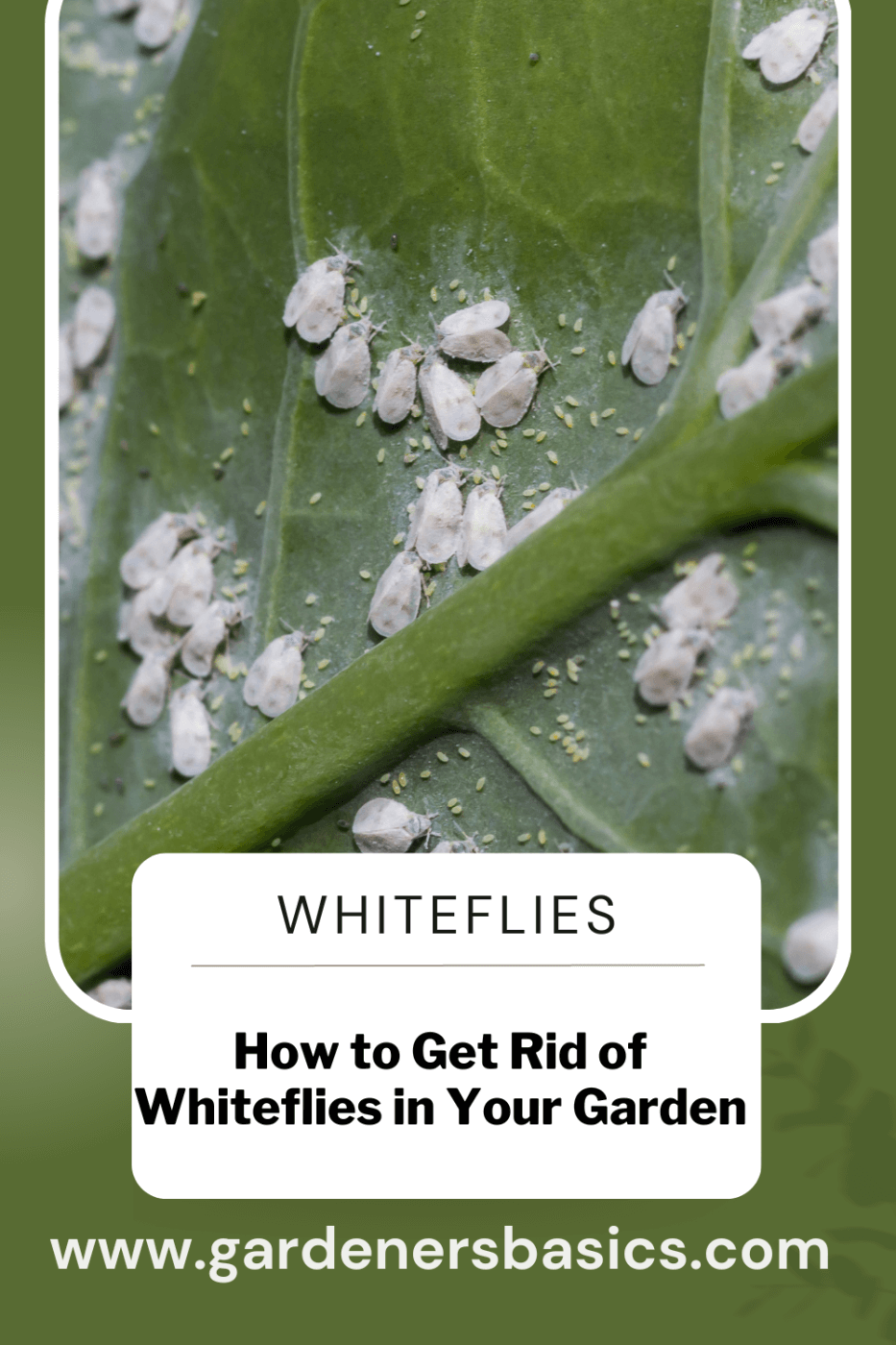 FAQ: How to Get Rid of Whiteflies in Your Garden
FAQ: How to Get Rid of Whiteflies in Your Garden
What are whiteflies?
Whiteflies are small, sap-sucking insects that can be a significant pest in gardens. They are typically found on the underside of leaves and can cause damage to plants by feeding on them, excreting honeydew, and transmitting plant viruses.
How can I identify whiteflies in my garden?
Whiteflies are tiny insects, about 1-2mm long, with a white, powdery appearance. They are usually found on the underside of leaves, and when disturbed, they fly off in a small white cloud. Additionally, you may notice yellowing leaves, stunted growth, and a sticky substance (honeydew) on the plant surfaces.
Are whiteflies harmful to humans or pets?
Whiteflies are not harmful to humans or pets, but they can cause significant damage to your garden plants.
What types of plants are most susceptible to whiteflies?
Whiteflies are attracted to various plants, including vegetables (tomatoes, peppers, and cabbage), ornamentals (fuchsia, hibiscus, and poinsettia), and fruit trees (citrus, avocado, and guava).
How can I prevent whiteflies in my garden?
Prevention methods include proper plant spacing, regular inspection and removal of infested plants, using reflective mulches, and introducing beneficial insects like lacewings, ladybugs, and predatory mites to your garden.
How can I control whiteflies if they've infested my garden?
Control methods include removing infested leaves, using water sprays to dislodge the insects, applying insecticidal soap or horticultural oil, or using chemical insecticides as a last resort.
Can I use homemade remedies to get rid of whiteflies?
Yes, homemade remedies like a soap and water solution or a mixture of water, dish soap, and neem oil can effectively control whiteflies when applied regularly to infested plants.
How long does it take to get rid of whiteflies in my garden?
The duration depends on the severity of the infestation and the control methods used. Early detection and control can lead to quicker eradication, while established infestations may take several weeks or longer to eliminate.
Is it necessary to treat the entire garden if only a few plants are infested?
Treating the infested plants and monitoring the surrounding plants for any signs of whiteflies is essential. Whiteflies can spread quickly, so regular inspections and prompt treatment can help prevent the infestation from spreading throughout the garden.
What should I do if my efforts to eliminate whiteflies are unsuccessful?
If you've tried various control methods and are still experiencing a whitefly infestation, consider contacting a local horticulturist, cooperative extension office, or a professional pest control company for guidance and assistance.



